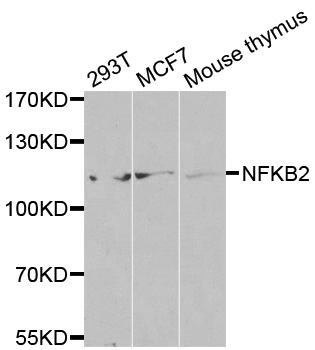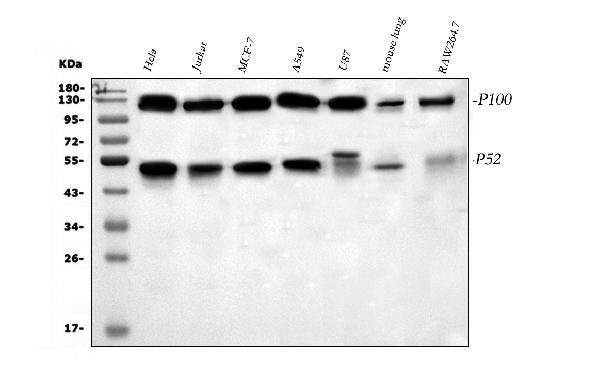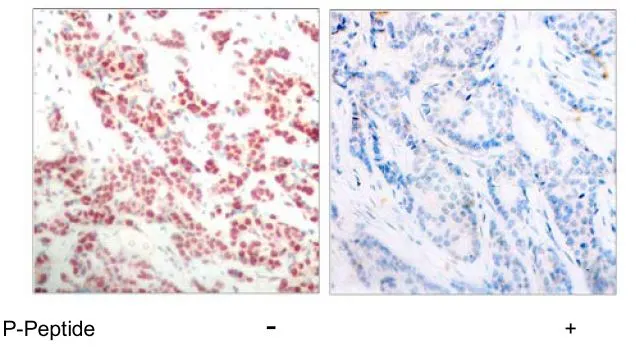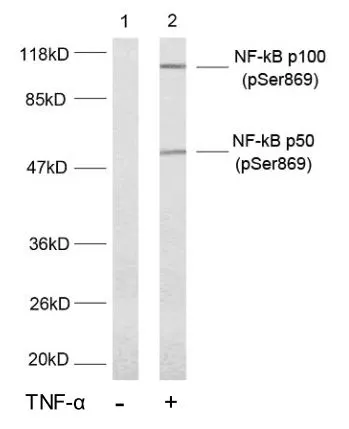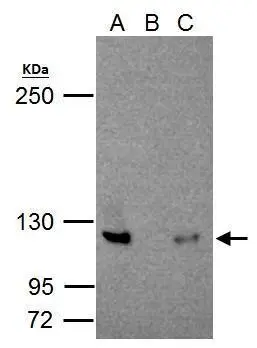
NFkB p100/p52 antibody immunoprecipitates NFkB p100/p52 protein in IP experiments. IP Sample: Jurkat whole cell lysate/extract A. 30 μg Jurkat whole cell lysate/extract B. Control with 2 μg of preimmune rabbit IgG C. Immunoprecipitation of NFkB p100/p52 protein by 2 μg of NFkB p100/p52 antibody (GTX101150) 5% SDS-PAGE The immunoprecipitated NFkB p100/p52 protein was detected by NFkB p100/p52 antibody (GTX101150) diluted at 1:1000. EasyBlot anti-rabbit IgG (GTX221666-01) was used as a secondary reagent.
NFkB p100 antibody [C2C3], C-term
GTX101150
ApplicationsImmunoPrecipitation, Western Blot
Product group Antibodies
ReactivityHuman, Mouse
TargetNFKB2
Overview
- SupplierGeneTex
- Product NameNFkB p100 antibody [C2C3], C-term
- Delivery Days Customer9
- Application Supplier NoteWB: 1:500-1:3000. IP: 1:100-1:500. *Optimal dilutions/concentrations should be determined by the researcher.Not tested in other applications.
- ApplicationsImmunoPrecipitation, Western Blot
- CertificationResearch Use Only
- ClonalityPolyclonal
- Concentration1 mg/ml
- ConjugateUnconjugated
- Gene ID4791
- Target nameNFKB2
- Target descriptionnuclear factor kappa B subunit 2
- Target synonymsCVID10, H2TF1, LYT-10, LYT10, NF-kB2, p100, p49/p100, p52, nuclear factor NF-kappa-B p100 subunit, DNA-binding factor KBF2, NFKB, p52/p100 subunit, lymphocyte translocation chromosome 10 protein, nuclear factor Kappa-B, subunit 2, nuclear factor NF-kappa-B p52 subunit, nuclear factor of Kappa light chain gene enhancer in B cells 2, nuclear factor of kappa light polypeptide gene enhancer in B-cells 2 (p49/p100), oncogene Lyt-10, transcription factor NFKB2
- HostRabbit
- IsotypeIgG
- Protein IDQ00653
- Protein NameNuclear factor NF-kappa-B p100 subunit
- Scientific DescriptionNFKB has been detected in numerous cell types that express cytokines, chemokines, growth factors, cell adhesion molecules, and some acute phase proteins in health and in various disease states. NFKB is activated by a wide variety of stimuli such as cytokines, oxidant-free radicals, inhaled particles, ultraviolet irradiation, and bacterial or viral products. Inappropriate activation of NF-kappa-B has been linked to inflammatory events associated with autoimmune arthritis, asthma, septic shock, lung fibrosis, glomerulonephritis, atherosclerosis, and AIDS. In contrast, complete and persistent inhibition of NF-kappa-B has been linked directly to apoptosis, inappropriate immune cell development, and delayed cell growth. For reviews, see Chen et al. (1999) [PubMed 9895331] and Baldwin (1996) [PubMed 8717528].[supplied by OMIM]
- ReactivityHuman, Mouse
- Storage Instruction-20°C or -80°C,2°C to 8°C
- UNSPSC41116161

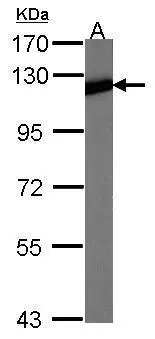
![Wild-type (WT) and NFkB p100 knockout (KO) HeLa cell extracts (30 μg) were separated by 7.5% SDS-PAGE, and the membrane was blotted with NFkB p100 antibody [C2C3], C-term (GTX101150) diluted at 1:500. The HRP-conjugated anti-rabbit IgG antibody (GTX213110-01) was used to detect the primary antibody. Wild-type (WT) and NFkB p100 knockout (KO) HeLa cell extracts (30 μg) were separated by 7.5% SDS-PAGE, and the membrane was blotted with NFkB p100 antibody [C2C3], C-term (GTX101150) diluted at 1:500. The HRP-conjugated anti-rabbit IgG antibody (GTX213110-01) was used to detect the primary antibody.](https://www.genetex.com/upload/website/prouct_img/normal/GTX101150/GTX101150_39549_20170427_WB_KO_watermark_w_23060100_524.webp)
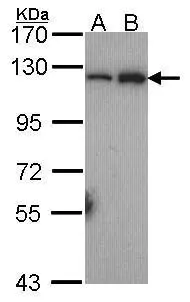
![NFkB p100 antibody [C2C3], C-term detects NFkB p100 protein by western blot analysis. Whole cell extracts (30 μg) was separated by 7.5% SDS-PAGE, and the membrane was blotted with NFkB p100 antibody [C2C3], C-term (GTX101150) diluted at 1:1000. NFkB p100 antibody [C2C3], C-term detects NFkB p100 protein by western blot analysis. Whole cell extracts (30 μg) was separated by 7.5% SDS-PAGE, and the membrane was blotted with NFkB p100 antibody [C2C3], C-term (GTX101150) diluted at 1:1000.](https://www.genetex.com/upload/website/prouct_img/normal/GTX101150/GTX101150_39549_20150924_WB_w_23060100_654.webp)



